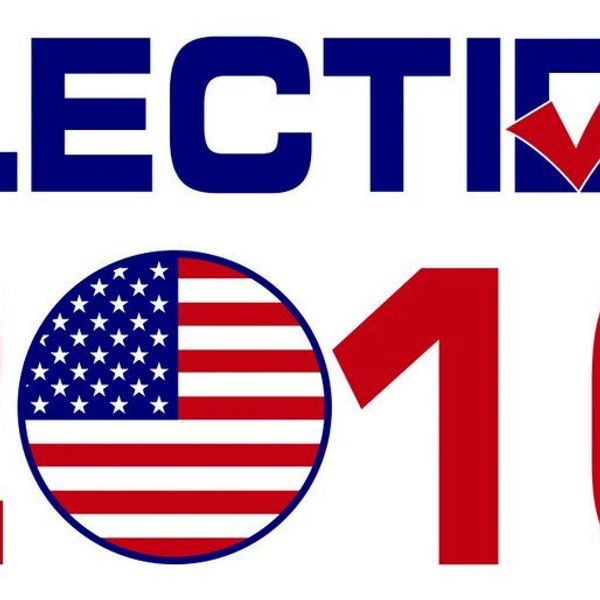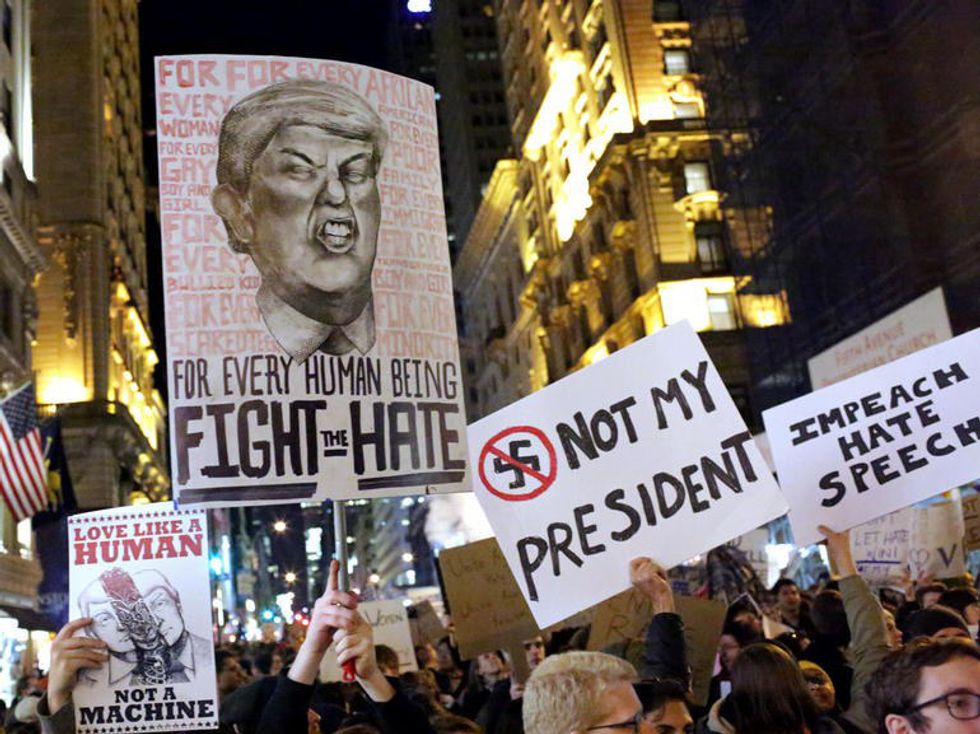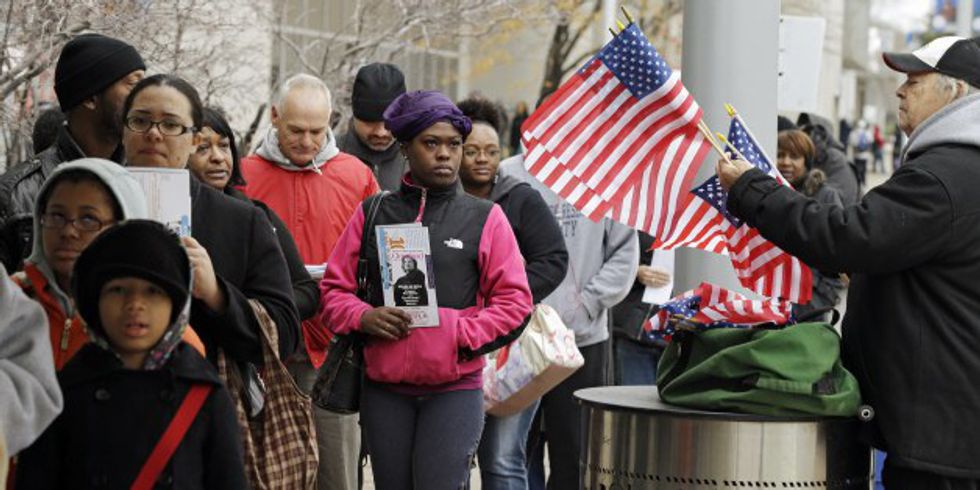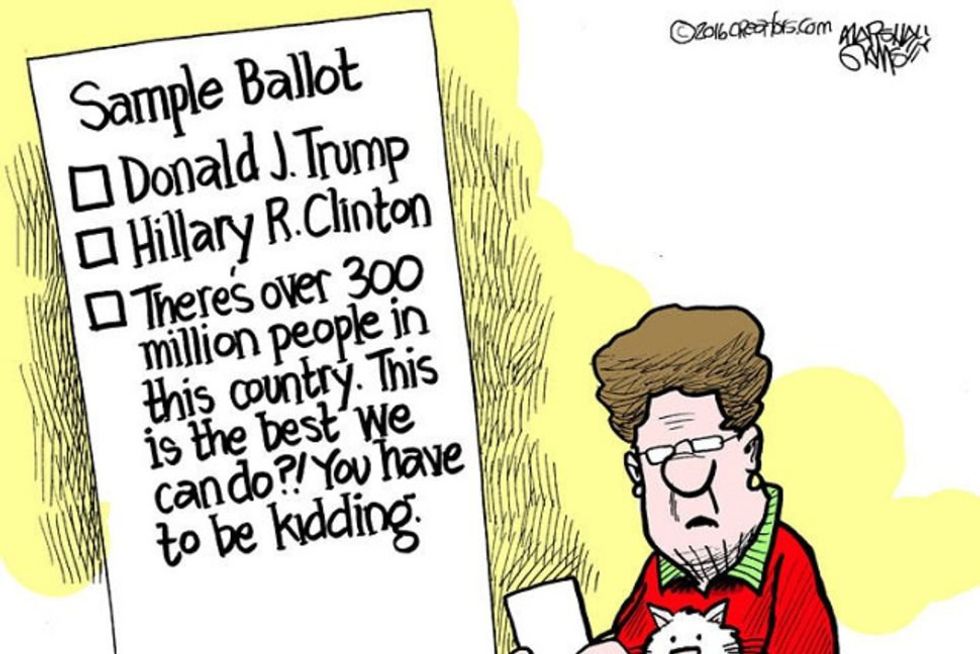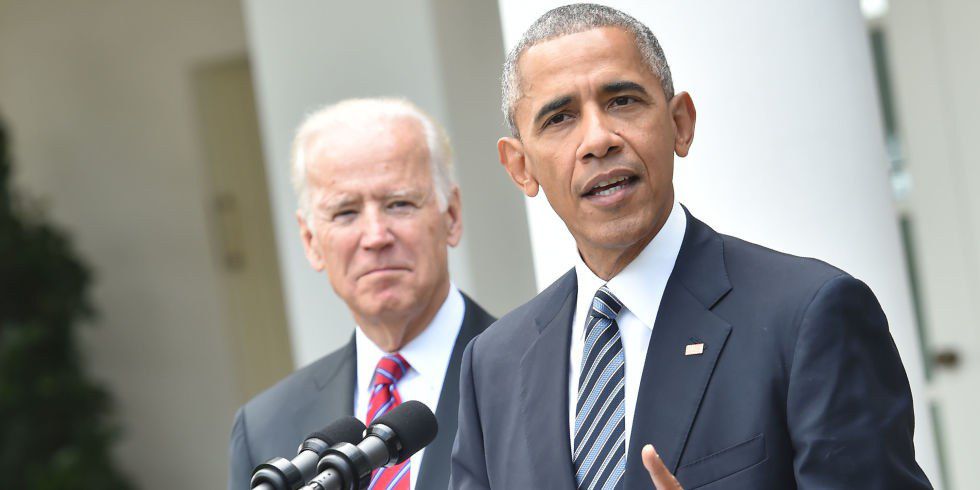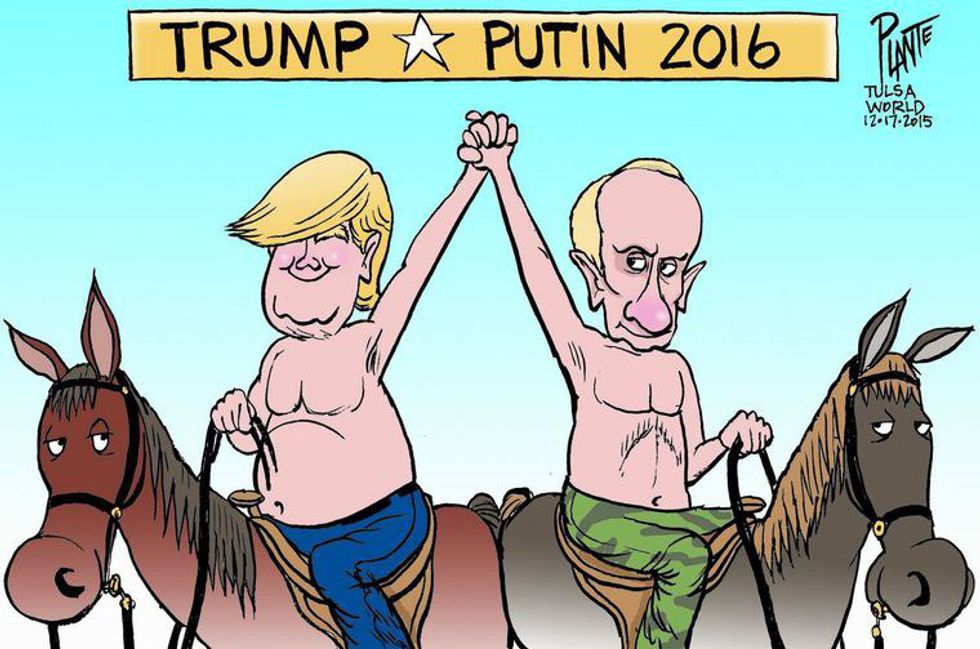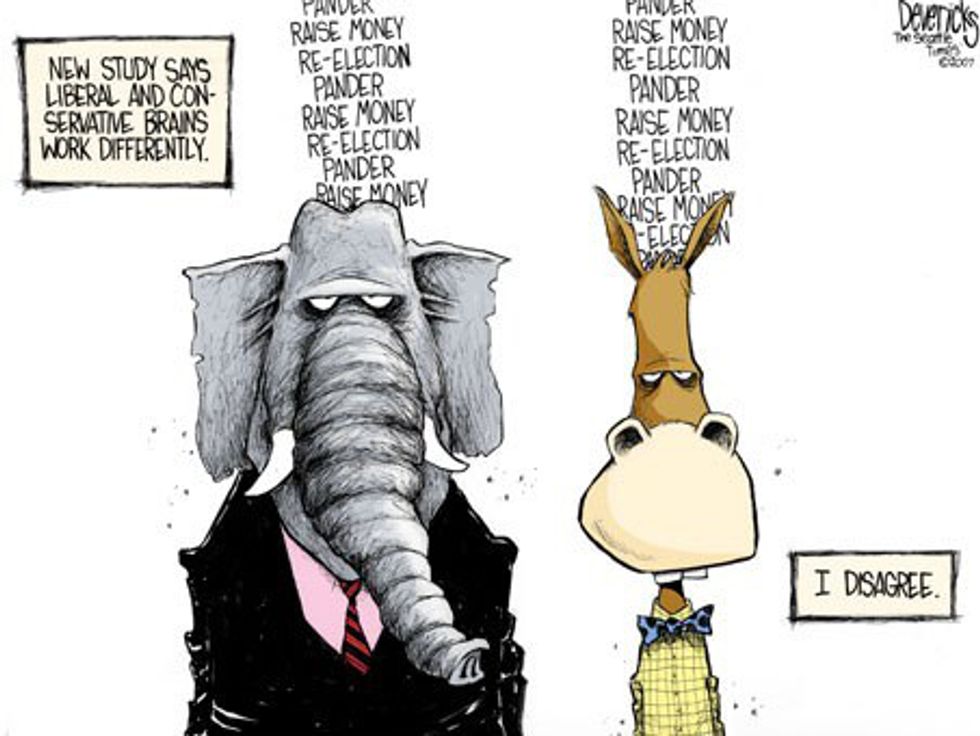In the wake of one of the most controversial political events of this American generation, the 2016 US Presidential election, tensions have grown at an alarming rate. While many Americans celebrated Donald Trump’s defeat of Hillary Clinton in the election, the results sparked heavy outrage among others. On Tuesday evening and throughout the remainder of the week, social media was especially rife with satirical memes, scornful posts, and even more fearful sentiments among those who strongly opposed Trump.
Unfortunately, negative attitudes on both sides were not limited to computer screens. From the first day after the election, there appeared to be an increase in reports of bias-based attacks and, more specifically, hate crimes from both presumably Trump and Clinton supporters. Reports surfaced on news outlets about pro-Trump phrases and swastikas being painted on buildings, racist threats spreading, and even violent, politically-motivated attacks on individuals. As well, ardent liberals and anti-Trump groups coined new hashtags and phrases, as mild as “not my president” and as disturbing as “rape melania,” while taking to the streets to protest the voting process and results.
So, what was the cause for all of this indignation? On November 8th, Trump won the presidential election, surpassing the 270 electoral vote finish line all the way to 290 electoral votes; Clinton only received 232 electoral votes. However, anger over Clinton’s loss was partially influenced by the results of the popular vote, which refers to the number of votes overall nationwide. Clinton won roughly 61 million popular votes over Trump’s roughly 60.4 million popular votes. This situation is comparable to the 2000 presidential election results, in which George W. Bush won 271 electoral votes over Al Gore’s 266 electoral votes; Gore won the popular vote with nearly 51 million popular votes over Bush’s roughly 50.5 million popular votes. Now, let’s look at a more detailed breakdown of the voter turnout information behind our election results.
Regarding populations in certain locations, there were quite a few surprises for pollsters. Clinton fairly easily won states in the northeast, such as New York, New Jersey, and Vermont, just as Trump won Texas, Kentucky, and Tennessee with ideal margins. However, many were surprised to see states like Pennsylvania, which has historically voted Democratic, vote red for Trump. For the most part, states in the midwest and rural areas, which use food, fiber, manufactured goods, and energy as means to stimulate their economies, voted for Trump. States such as Ohio, Louisiana, West Virginia, and Idaho are considered “carbon-intensive economies,” where fracking and other oil extraction practices have especially helped boost these economies. For them, Trump’s rejection of global warming and embracing of oil extractions may seem like a guarantee of financial well being.
As one could expect, several other factors made key impacts on the election; these include race/ethnicity, gender, education-level, and income-level. However, income-level did not seem to play as big of a role as some other factors, as votes seemed to be split almost evenly between the candidates for Americans making as low as $50,000 annually and as high as $250,000 annually; Clinton did have noticeably more votes from Americans making below $50,000 annually. Age group and race/ethnicity played a larger role in the election. Unlike Barack Obama in the 2008 election, Clinton did not do as well motivating young, African American, and Latino voters. Of those Blacks, Latinos, and young individuals between the ages of 18 and 29 years old who voted, Clinton received 88%, 65%, and 55% of votes respectively. Trump fared much better among whites, those between the age of 45 and 64 years old, and those above the age of 65 years old who voted, receiving 58%, 53%, and 53% of votes respectively. Some people find it ironic that Trump gained more votes from white women than Clinton did, especially following the media spotlight and public outrage over Trump’s explicitly sexist attitudes, comments, and potentially actions in the past and present.
Regarding education-level, it seems that Trump garnered slightly more support from individuals with some college education/associate degrees and less than college education who voted, with 52% and 51% of votes respectively. Clinton garnered more support from college graduates and those with post-graduate education, with 49% and 58% of votes respectively. Some make the claim that the apparent positive relation between education-level and votes for Clinton may be a result of liberal biases in higher education. This idea argues that there is a “monolithic, insulated political culture in the vast majority of [American] universities” because of differences between college-educated and uneducated voters in values, norms, and understandings of facts, as well as a lack of “philosophical, theological and political diversity.”
Regardless of the voter turnout, Donald Trump dominated the election from start to finish. Following the election results, which contradicted numerous poll predictions, many individuals from the media to the government had fingers to point. You may wonder what was the number one target of blame? Well, the electoral college system was. Many Democrats and anti-Trump groups were frustrated enough by the electoral college for allowing Trump to win that they protested its continuation, instead proposing that the popular vote should take replace this old system. However, such intents are highly unlikely to prove fruitful, especially because such a change would require a constitutional amendment. This involves a two-thirds vote in the House of Representatives and the Senate, which both have a Republican majority, and the ratification by 38 out of the 50 states. The chances of such a possibility are so slim that it is, arguably, hardly possible at all.
Third-party candidates Gary Johnson and Jill Stein, as well as those who voted for them, were also blamed for wasting votes that could have gone to Hillary Clinton. Even before the election, it was not uncommon to find posts on social media by liberals and conservatives alike attempting to make the case for forgoing a vote for either third party candidate in favor of Clinton or Trump. However, such positions undermine the very nature of “democracy,” which involves the freedom of choice. As well, arguments claiming that Clinton would have won if Johnson or Stein had dropped out of the race are largely unfounded; this oversimplified logic does not clearly shown that Clinton would have received enough extra votes to win if the third party candidates had dropped out of the race.
Facebook CEO Mark Zuckerberg has been addressing criticisms about the website’s potential responsibility for the election results since the election. Reports surfaced following the election claiming that many fake, disproportionately pro-Trump news stories and click-bait articles were shown to millions of voters before the election. Although Zuckerberg was originally in denial of the site’s negative role, he later conceded in a Facebook post that the site’s fake news problem is not necessarily “trivial” and insisted that it is “extremely unlikely [that] hoaxes changed the outcome of this election.”
Even Hillary Clinton herself pointed fingers at FBI director James Comey, who reopened the investigation of Clinton’s use of her private email server only 11 days before the election. In a conference call with her donors, Clinton stated that the new investigation “thrust the controversy back into the news” and “prevented her from ending the campaign with an optimistic closing argument.” She went on to explain that the “seemingly positive outcome” of the investigation, which cleared her again of any potential charges only 2 days before the election, only further damaged her campaign. This outcome may have only empowered those who distrusted Clinton and Trump supporters who claimed that the system was rigged because it likely seemed that Clinton’s lack of charges were part of some conspiracy or evidence of corruption.
There were, however, some more positive and hopeful reactions from Democrats like Bernie Sanders, Cory Booker, and especially President Obama. The day after the election, Sanders wrote a brief Facebook post to console his supporters, stating:
“To the degree that Donald Trump is serious about pursuing policies that improve the lives of working families in this country, I and other progressives are prepared to work with him. To the degree that he pursues racist, sexist, xenophobic and anti-environment policies, we will vigorously oppose him.”
Similarly, Booker offered a long and hopeful Facebook post to encourage his supporters to “recommit to the cause of our country” in spite of the election defeat. President Obama was especially professional in his reaction and congratulations for president-elect Trump on the day after the election. In his address to the American public, Obama guaranteed his effort to maintain a smooth and successful transition of power to Trump, regardless of their differences, expressing how he and the American people are all “rooting for [Trump’s] success in uniting and leading the country." Obama will also reportedly spend more time counseling Trump about his expected responsibilities as the president than past presidents have with their successors, as a result of Trump’s lack of familiarity with the government and the presidency.
Now that Trump is the future president, there are many implications for what his presidency may look like. Of course, as Obama is still the current president, any claims about Trump’s presidency are limited to speculation, even if they are well-informed. Using information from Trump’s transition team, lawmakers, lobbyists, and Washington experts, reporters have compiled a short list of his possible cabinet members and other high-ranking officials. Trump has announced his White House Chief of Staff and Chief Strategist as Reince Priebus and Stephen Bannon, respectively. The appointment of Bannon to such a position has already drawn heavy criticism from many who view him as a nationalist, anti-Semite, and racist, who champions white supremacy. However, President Obama was quick to express the need for Trump to have room to make his decisions, which the American people will judge over the next few years. Other potential appointments include well-known Republicans such as Newt Gingrich, Rudy Giuliani, and Ben Carson.
Trump has unsurprisingly drawn criticism as well for hiring Myron Ebell as head of the Environmental Protection Agency transition team, which reaffirms Trump’s intention to undo Obama’s policies to combat climate change. Although not a scientist, Myron Ebell has publicly decried climate change policies for years as an “alarmist, overzealous environmental movement that has used global warming as a pretext for expanding government.” Many worry that this move on Trump’s part will further endanger the future of our planet in exchange for flourishing oil, gas, and coal sectors. As well, by rejecting climate change, Trump is also disregarding international efforts to slow greenhouse gas emissions.
Another early target of criticism has been Trump’s seemingly contradictory views on abortion and marriage equality legislation. When asked about his stance on Obergfell v. Hodges, which legalized same-sex marriage, Trump stated that he was “fine” with it and that the Supreme Court had already “settled” the issue back in 2015. However, concerning Roe v. Wade, which affirmed abortion rights way back in 1973, Trump has pledged his commitment to repealing the legislation. This inconsistency poses a dilemma for conservatives, many of whom denounce both pieces of legislation; it is hard for justices to justify the repeal of one of these social laws and not the other. As well, because Supreme Court judges build on precedence and seek continuity in the law by attempting to avoid overturning prior decisions, Trump’s intention to end the practice of abortion may be a battle in itself.
There is also a healthy level of curiosity surrounding Trump’s seemingly positive relationship with Russia and China. It has been clear for the past several months that Trump has had close communications with President Putin of Russia, who called him to offer congratulations on his win. Following his victory in the election, Trump also reached out to President Xi Jinping of China to express his intent to cooperate. Although this action can be viewed as admirable on Trump’s part, many do wonder what might be the impact of his past statements about China. He has previously threatened to impose tariffs on Chinese imports and even accused China of fabricating the idea of climate change. However, according to Trump’s transition team and his recent gestures, President-elect Trump is on good terms with the Russian and Chinese leaders.
Regardless of your views of Donald Trump as the future American president, the election results are set in stone. Protesting the election results, while a right for any citizen, will likely not bring about any changes to this fact. As well, attempting to blame individuals for the results of the election will bring about nothing but more divisive rhetoric. Not every individual who voted for Trump is a racist, sexist, or a xenophobe, nor should liberals or Democrats treat all Trump supporters as such. In my opinion, a large part of the reason that many people did not accurately predict the outcome of the election may be because some individuals did not feel comfortable voicing their opinions and support for Trump.
Liberals and conservatives-alike cannot just make the assumption that either one side is automatically correct because this goes against the very acts that are necessary for positive changes: discussions and debates. In my controversial opinion, liberals tend to think that “the cultural war” has already been won and those with opposing viewpoints are simply wrong or unacceptable. It often appears as though most or all conservatives are viewed by liberals as deplorable or less intelligent, which may breed feelings of silent resentment and dissent. Within this notion, I am making the distinction between those who simply have largely conservative views and those who truly are racist, sexist, xenophobes, and/or somehow prejudiced. Individuals who do not support equality are not the target of my perspective.
When one side seems to feel as though it cannot articulate its ideas, or feels embarrassed to voice its opinions, then progress is not being made; the lack of progress is being shoved under a rug. While the same may be true vice-versa, it seems to be overwhelmingly true that liberals do attempt to claim a moral and ethical sense of superiority when silencing those with starkly contrasting views. I do believe that this is why many individuals felt no reservations about voting for Trump in the safety and virtual anonymity of their voting booths on election day. So, keep this in mind next time you are having a discussion with someone who has a strongly opposing argument to yours. Being offended and throwing insults is not enough to bring positive changes; it will likely bring more negative ones. Assuming that a level of respect is maintained, you should always encourage debate rather than dismiss opinions. Talk to people with different views than your own and persuade them of your argument.

